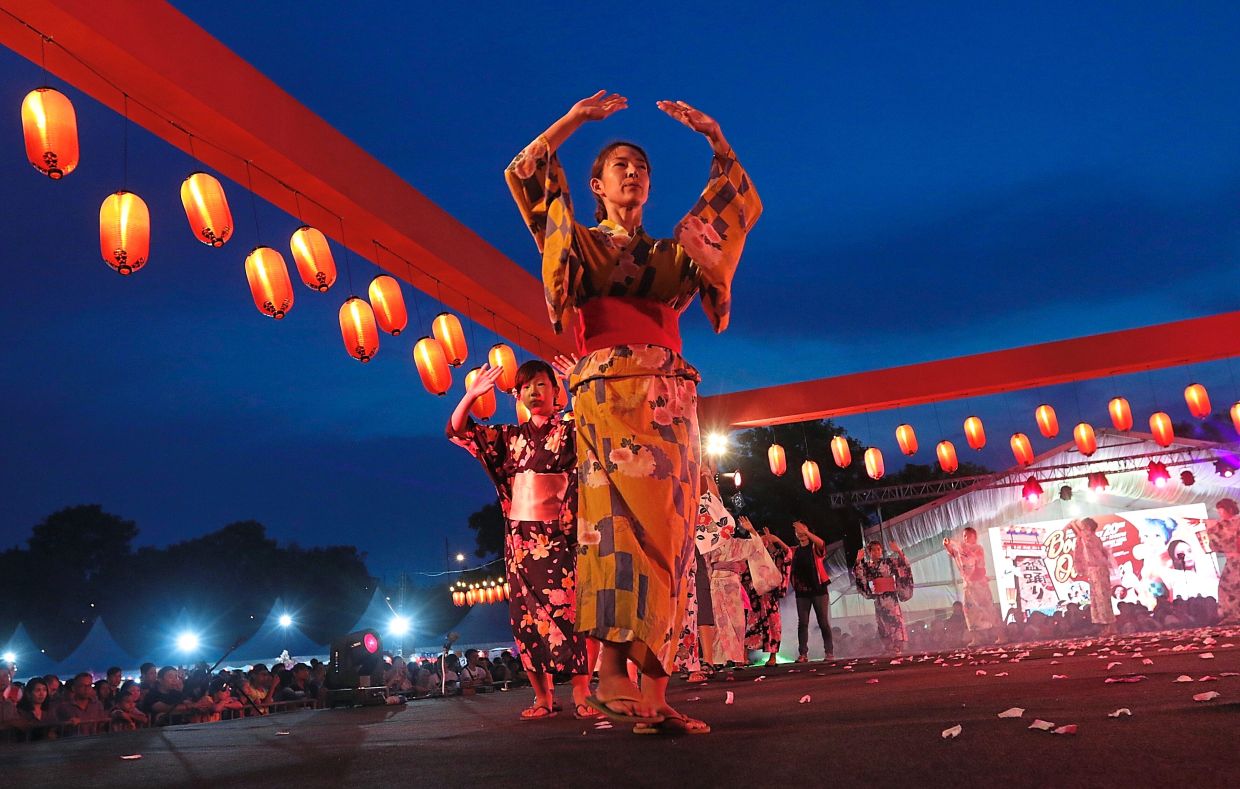
Cultural event: Bon Odori has been organised in Malaysia since 1977 by Japanese expatriates. — ZHAFARAN NASIB/The Star
The Rulers have spoken, so there’s no chance for Malaysians to be denied a cultural experience.
WHEN Datuk Idris Ahmad, Minister in the Prime Minister’s Department (Religious Affairs), made the announcement that Muslims should stay away from the Bon Odori festival in Selangor, the PAS leader obviously had no idea how far he had overstepped his authority.
For some time now, the Malay Rulers have been unhappy about certain politicians and religious figures making statements on Islam without recognising that the real authority on religious matters is the Rulers.
The nine Rulers are the heads of Islam and Malay customs in their respective states.
As for the states without a monarch, the Federal Constitution provides for the Yang di-Pertuan Agong to assume the role of the head of Islam.
So, despite holding the position of a federal minister of Islamic affairs, Idris has no real authority to dictate rules in the various states.
When he claimed the Japanese summer festival, which has been celebrated in Malaysia for nearly 45 years, was “influenced by elements of other religions,” it hit a raw nerve.
After all, Sultan Sharafuddin Idris Shah – the head of Islamic affairs in Selangor – had previously attended the event in the state.
Idris crossed the line, and the Selangor palace would not allow that.
The PAS leader alleged that based on a study conducted by the Department of Islamic Development Malaysia (Jakim), the festival contains rituals of other religions.
His remarks upset the Selangor palace as the Bon Odori festival is scheduled to be held at the Shah Alam National Sports Complex on July 16.
In a rebuke, His Royal Highness decreed the Selangor Islamic Religious Department (Jais), the Shah Alam City Council (MBSA) and Idris attend the festival to learn the difference between culture and religion.
But while Idris has chosen to remain silent following the Sultan of Selangor’s statement, the Islamist party hasn’t helped its cause by openly going against the Ruler’s decree.
A series of defiant statements by PAS leaders appear to be an attempt by the party leaders to coax Idris to exert his authority as the federal minister of religious affairs.
Last week, Selangor PAS commissioner Datuk Dr Ahmad Yunus Hairi was summoned by his Royal Highness to a meeting at Istana Bukit Kayangan.
But the matter has been aggravated by a statement by Selangor PAS secretary Roslan Shahir Mohd Shahir – who wasn’t present at the meeting.
The same week, the Selangor palace issued another statement denying that Tuanku had sought PAS’ opinion during an audience on Bon Odori.
Instead, the palace said the monarch only stated his views regarding the Japanese event during the meeting.
The denial was in response to a New Straits Times article on Wednesday, which cited Roslan Shahir saying that His Royal Highness wanted to know the party’s position on Bon Odori.
But the latest incident seems to give the impression that PAS, and by extension, Idris, has not been happy with the authority bestowed on Sultan Sharafuddin by the Conference of Rulers to head the National Council of Islamic Affairs (MKI) in April.
The Ruler, as the council’s chairman, had decreed that Jakim could not issue any statement regarding decisions made by the council since this was now under the jurisdiction of the Muzakarah committee, the MKI and the Conference of Rulers.
It was also announced that Jakim would only act as the secretariat to the Muzakarah committee and MKI.
The decision of the Rulers was significant – the authority of Islamic affairs lies with the respective Sultans and His Majesty.
In 2015, Sultan Ibrahim Ibni Almarhum Sultan Iskandar asked Jakim to explain its expenditure and justify its demand for RM1bil in annual allocations and reminded it that the Conference of Rulers was the highest authority on Islamic affairs and the agency’s function was only advisory.
“We are the heads of religion in our own states. Jakim can give advice or propose guidelines, but it is up to us whether we want to accept it or not,” he had said.
Last week, the Sultan of Perak also made an important statement – that Malaysia must aim to maintain the values that have brought post-independence to all its communities despite the challenge it faces.
Sultan Nazrin Shah said Malaysia must champion and remain an exemplar of multiculturalism.
The statements and actions of the two Rulers are a beacon of hope at a time when political figures, using the veil of religion, appear to wield their clout with impunity.
Personal interpretations of religious matters have become laws, without any thought on the consequences for the multiracial fabric of Malaysia.
The silence of many politicians on the Bon Odori issue and failure to back Sultan Sharafuddin smacks of political expediency and reluctance to defend the role of the Rulers, which is clearly defined in the Federal Constitution.
But beyond that, it’s disturbing and tragic that Bon Odori, which has been organised in Malaysia since 1977 by Japanese expatriates, has become a religious and political controversy.
The event in Selangor – touted as the largest outside Japan – is jointly organised by the Japan Club of Kuala Lumpur, the Japanese School of Kuala Lumpur, and the Japanese Embassy, with support from the state government. The event is also held in Penang, the home of many Japanese investors, with the support of the Penang state government.
Ironically, the Mufti of Penang, Datuk Seri Wan Salim Wan Mohd Noor, who had earlier said Muslims should avoid the event, has made a U-turn, and now says Muslims are not barred from taking part in cultural events like the Bon Odori festival, seemingly backtracking on his earlier stance.
It doesn’t look like Malaysians, who believe in a moderate Malaysia that aspires to embrace diversity, can depend on our politicians.
Daulat Tuanku!





